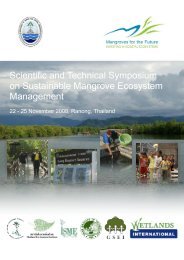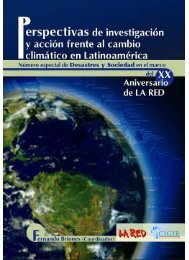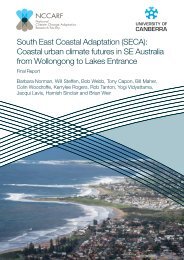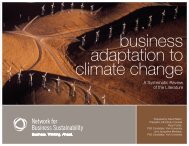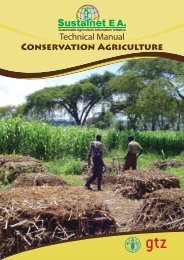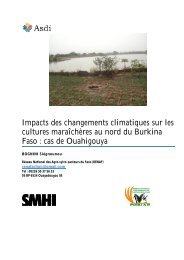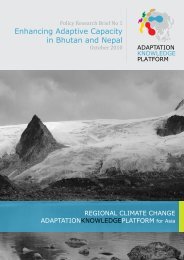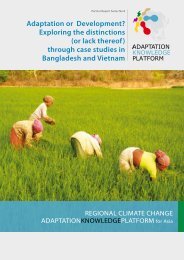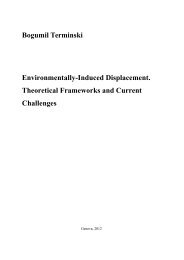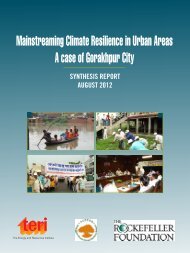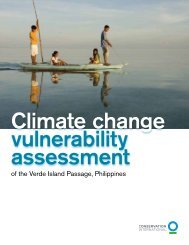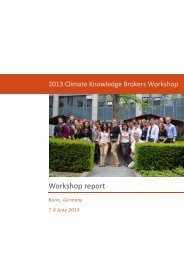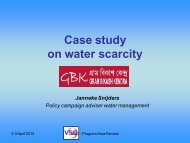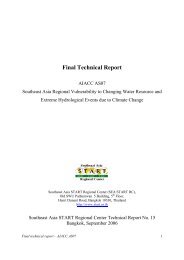Urban food security, urban resilience and climate change - weADAPT
Urban food security, urban resilience and climate change - weADAPT
Urban food security, urban resilience and climate change - weADAPT
You also want an ePaper? Increase the reach of your titles
YUMPU automatically turns print PDFs into web optimized ePapers that Google loves.
allied to strong notions of autonomy in local <strong>food</strong> systems. In the ground-breakingInternational Assessment of Agricultural Knowledge, Science <strong>and</strong> Technology forDevelopment, <strong>food</strong> sovereignty is defined as ‘the right of peoples <strong>and</strong> sovereign statesto democratically determine their own agricultural <strong>and</strong> <strong>food</strong> policies’ (McIntyre, et al.,2009, p. 111). More than simply about access, <strong>food</strong> sovereignty seeks to maketransparent the power relationships inherent in agricultural <strong>and</strong> <strong>food</strong> systems as aprecursor to changing these into more equitable systems.As more of the world’s population lives in cities, so questions of <strong>food</strong> <strong>security</strong> <strong>and</strong> <strong>food</strong>sovereignty increasingly take on an <strong>urban</strong> dimension. While much debate is concernedwith how to produce enough <strong>food</strong> for a growing <strong>urban</strong> population <strong>and</strong> how to securelines of supply from rural places of production to <strong>urban</strong> places of consumption, greaterattention is now also being paid to the systems of production, processing <strong>and</strong>distribution of <strong>food</strong> within <strong>urban</strong> areas. Recent recognition of the extent of <strong>food</strong> wastage(Institution of Mechanical Engineers, 2013) illustrates that <strong>food</strong> <strong>security</strong> should not belimited, conceptually or practically, to the nature <strong>and</strong> volume of production but extendedto matters of distribution, access <strong>and</strong> control.The production of <strong>food</strong> within <strong>urban</strong> areas is an important component of <strong>urban</strong>agriculture, along with systems of <strong>food</strong> processing, distribution <strong>and</strong> sale. Themanagement of waste from these processes is another important element in this broadconception of <strong>urban</strong> agriculture. There is scope, therefore, for <strong>urban</strong> agriculture tomake an important contribution to strengthening <strong>urban</strong> <strong>food</strong> <strong>security</strong>. This can in turnhelp build <strong>urban</strong> <strong>resilience</strong> <strong>and</strong> promote more sustainable forms of <strong>urban</strong> life.<strong>Urban</strong> <strong>resilience</strong> has entered the lexicon of <strong>urban</strong> studies <strong>and</strong> indeed <strong>urban</strong> policy inrecent years <strong>and</strong> typically takes a broad view of the capacity of cities of respond to orrecover from external threats <strong>and</strong> shocks. Pickett et al.(2004) propose the metaphor of‘resilient cities’ as a means of linking the disciplines of ecology <strong>and</strong> planning into amore productive relationship to better underst<strong>and</strong> some of the major problemsconfronting contemporary cities <strong>and</strong> indeed to propose effective solutions to them.They propose also that the ‘old paradigm’ of ecology based on an equilibrium model isreplaced by a non-equilibrium paradigm which connects structure <strong>and</strong> function in sucha way that <strong>resilience</strong> becomes the ability of a system to adjust in the face of changingconditions rather than simply returning to its previous equilibrium condition after adist<strong>urban</strong>ce. In the context of <strong>urban</strong> <strong>resilience</strong> or the <strong>resilience</strong> of cities this ‘newparadigm’ is especially valuable as the uncritical pursuit of a past condition isunavoidably retrograde <strong>and</strong> almost certainly doomed to failure.In contrast, University College London’s Centre for <strong>Urban</strong> Sustainability <strong>and</strong> Resilienceadopts an engineering focussed view of <strong>resilience</strong> <strong>and</strong> describes it as:a newer concept [than sustainability] dealing with the issue of how to mitigate theeffects of environmental disasters <strong>and</strong> terrorism, incorporating seismic <strong>and</strong>volcanic hazard, flood risk, the spread <strong>and</strong> control of disease, <strong>security</strong> <strong>and</strong>situational awareness (UCL CUSR website: why <strong>urban</strong> sustainability <strong>and</strong><strong>resilience</strong>?).One of the key questions posed at the outset of this review concerns the capacity of<strong>urban</strong> agriculture to play a more prominent role in enhancing <strong>food</strong> <strong>security</strong> <strong>and</strong> hence<strong>Urban</strong> <strong>food</strong> <strong>security</strong>, <strong>urban</strong> <strong>resilience</strong> <strong>and</strong> <strong>climate</strong> <strong>change</strong> 58



